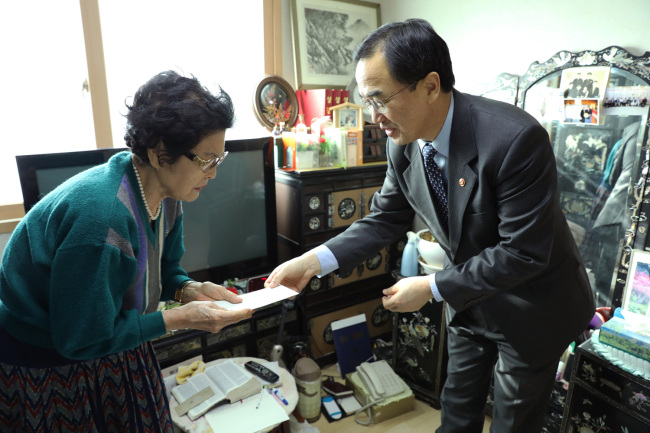Despite an inter-Korean detente that came with North Korea’s participation in the Winter Olympics, uncertainty continues to loom over the reunion of families separated by the 1950-53 Korean War.
 |
South Korean Unification Minister Cho Myoung-gyon visits a 94-year-old member of families separated by the 1950-53 Korean War on Feb. 13, ahead of the Lunar New Year holiday. The South Korean members, mostly in their 70s and 80s, have lost contact with their families in the North after the reunion events were halted in 2015. (Yonhap) |
But experts are saying that it‘s too early to lose hope and expects other key inter-Korean events and meetings to come first, before North Korea agrees to revive the event that has been halted since October 2015.
“Military talks are likely to come first to further alleviate the tension on the Korean Peninsula, then the red cross talks for the reunion of separated families is expected to fall in order,” Koh Yoo-hwan, a professor of North Korean studies at Dongguk University said.
South Korea had initially hoped for the reunion event to take place during this year’s Feb. 15-17 Lunar New Year holidays, but the plan fizzled as it failed to reach a consensus with the North. When Seoul brought up the issue at the inter-Korean high-level talks on Jan. 9, Pyongyang set repatriation of a group of North Korean restaurant workers who defected to the South in 2016 as a precondition for the event.
The South, however, has refused the offer saying the group defected of their own free will.
Koh also noted that North Korea has rarely treated the reunions as a separate “issue,” and has often tied it to other issues or a request, like a “package deal.”
“In the past, North Korea has also asked the South to revive the cross-border tour program to Kumkangsan in exchange for the reunion of the separated families,” added Koh.
Cross-border tour programs to the North’s eastern slopes of Kumkangsan were suspended in 2008 after a North Korean soldier fatally shot a South Korean tourist.
On military talks, South Korea’s Ministry of National Defense said the military is working on the relevant matters and waiting for North Korea to respond to the military dialogue proposal first made in July 2017. Last year, Pyongyang had remained mum on Seoul’s proposal to hold military talks and a separate Red Cross meeting to discuss reunions of separated families.
Among other results that came out on Jan. 9, the two Koreas agreed to hold a military dialogue as the North agreed to send a delegation to the PyeongChang Winter Olympics.
South Korea is expected to continue negotiations for the reunion event, but the old age of the separated family members has government officials and the political sphere calling for urgency.
More than 130,000 South Koreans, mostly in their 70s and 80s, have applied for reunions with their separated families in the North, and of them, over 70,000 have died of old age, according to government data.
Unification Minister Cho Myoung-gyon on Friday called on North Korea to accept South Korea‘s proposal to arrange a reunion event at a joint traditional Lunar New Year ceremony held at the Imjingak park near the border shared with North Korea.
“Both the South and the North should be ashamed of the current situation where no reunions of separated families are allowed,” said Cho.
South Koreans who were pushed apart from their families in the North by the civil war joined the ancestral ritual at the border to mark the traditional holiday.
“A family reunion event should be arranged as soon as possible without any conditions,” Cho said, reiterating that Seoul is willing to arrange reunions whenever and wherever if Pyongyang accepts its proposal for such events.
By Jung Min-kyung (
mkjung@heraldcorp.com)







![[Weekender] Korea's traditional sauce culture gains global recognition](http://res.heraldm.com/phpwas/restmb_idxmake.php?idx=644&simg=/content/image/2024/11/21/20241121050153_0.jpg)
